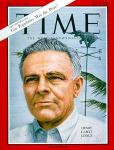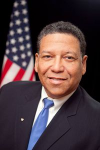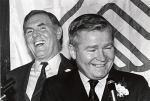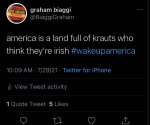 Henry Cabot Lodge II (Republican) 1965-1969
1964 Def. (with Gerald Ford) Lyndon B. Johnson (Democratic), various Southern Governors (Southern Democratic)
Henry Cabot Lodge II (Republican) 1965-1969
1964 Def. (with Gerald Ford) Lyndon B. Johnson (Democratic), various Southern Governors (Southern Democratic)
Henry Cabot Lodge I (posthumously referred to as the "Greater Lodge") was the greatest representation of Northeastern WASP Republicanism. A progressive through and through, he supported the rights of African-Americans to vote in the United States while simultaneously supporting the expansion of a United States empire to the periphery of the Caribbean and opposing Italian and Southern European immigration to the United States. Lodge, as with many liberal expansionists, saw no contradiction between these beliefs, justifying them with American nationalism. However, his greatest influence came many years later, when Lodge's ideals of imperialism and expansionism came into conflict with President Woodrow Wilson's ideals of liberal interventionism, which saw the empires of the past replaced with a sense of American influence over smaller nations. The same ideals of the European empires (and Lodge's ideology) were expressed - America was a superior nation, so why not spread its superiority on the less fortunate? But, Wilson argued, the old empires were too brutal, instead the new empire would be built around exerting its influence, not creating colonies. This conflict came to a head over the League of Nations, which saw Wilson's idea of a powerful multinational system pushing Western Civilization on the rest of the world. Lodge, sticking to the ways of the old as always, led the fight against the League, and he won, causing the United States to never enter the soon to be failed League. However, Wilson's ideology would still appear to be winners, as the United States would
not become an empire in the years following the World Wars, and instead continue Wilson's ideology of exerting its influence. That was, of course, until his son came into power.
It's ironic that Henry Cabot Lodge Jr. (now known as "the Lesser Lodge") would be the man who returned America to the age of empires. Despite his fathers believe in Anglo-Saxon supremacy, Lodge faced his first electoral defeat to Irish Catholic Jesus, John F. Kennedy, in 1952, jump-starting Kennedy's career and seemingly ending his. However, when Kennedy was running for president in 1960, Richard Nixon, cunning as always, picked Lodge, despite the conservative wing of the party crying out for someone like Walter Judd. Lodge, however, cost the Republicans another election to Kennedy, with his often controversial statements on the campaign trail hurting Nixon. Still, Lodge remained popular, and was able to become Ambassador to South Vietnam in 1963, which ironically allowed him to still gain national attention. When Kennedy was killed by the New Orleans Mob in 1963, Lodge was soon kicked out of the Johnson administration. However, Lodge was pretty intensely popular, and liberal Republicans, hoping to retain control of the party, won him a write-in campaign for president in New Hampshire. Many compared Lodge's draft campaign to that of his old friend Eisenhower's, and with Eisenhower's enemy Goldwater looming and Lodge dominating the polls, officially threw his name in the hat in April, easily winning New Jersey and Pennsylvania, while Goldwater struggled against
Harold Stassen (who would later be a member of Lodge's cabinet) of all people in Indiana. Wins in Oregon and California, with perennial candidate Robert Ennis defeating the Goldwater slate in Maryland solidified Lodge's victory, and endorsements from Eisenhower, Nixon, and New York Governor Nelson Rockefeller allowed for Lodge to somewhat unite the party behind him, especially after choosing "Young Turk" conservative representative Gerald Ford..
Although Lodge was popular, the wake of President Kennedy's assassination meant that many saw Lyndon B. Johnson as unbeatable. However, his campaign would end up gradually wearing down. The first sign of trouble came in the Maryland Democratic primary, when conservative Segregationist Alabama Governor George Wallace defeated Johnson surrogate and governor J. Millard Tawes. Many feared that this would lead Robert Kennedy to jump in for fears of Johnson's "weakness", but Johnson refused to drop out or change. Wallace's victory emboldened Southern Democrats, who, after the nomination of Lodge over Barry Goldwater, decided to run various slates in an attempt to stall the electoral college. Johnson feared retribution from the South, and decided against his gut pick of Hubert Humphrey, instead picking the relatively unimportant and inoffensive Thomas Dodd (after rejecting the idea he would pick
any cabinet official). It was here that Johnson would end up collapsing. While Lodge ran a speaking tour across key states, utilizing his popularity and foreign experience, Johnson was hit with various scandals. The first was Bobby Baker, a key Johnson staffer who had committed various financial and probably sexual crimes, throwing dirt on the Johnson campaign, which led many Lodge ads to (without a shred of irony), call Johnson an "insider". Johnson attempted to fight back, running negative attack ads across the nation, hoping to himself scuff up Lodge's reputation. While this somewhat worked, Lodge continued to rise in the polls. The final straw was the October announcement that Thomas Dodd, who had pretty much spent the entire campaign twiddling his thumbs (in contrast to the active Ford), had taken campaign contributions and used them for personal gain. The air of corruption that surrounded the Johnson campaign led to him hastily dropping Dodd, and after failing to convince Robert Kennedy to hop on the campaign as his running mate, he convinced Eugene "Clean Gene" McCarthy, who took the position in the hopes that the lasting popularity of Kennedy would save the ticket.
It would not.
 Fmr. Ambassador Henry Cabot Lodge (R-MA)/Representative Gerald Ford (R-MI): 285 EVs, 49.3% PV
President Lyndon B. Johnson (D-TX)/Senator Eugene McCarthy (D-MN): 212 EVs, 48.1% PV
Various Southern Governors (SD-Various): 41 EVs, 2.4% PV
Fmr. Ambassador Henry Cabot Lodge (R-MA)/Representative Gerald Ford (R-MI): 285 EVs, 49.3% PV
President Lyndon B. Johnson (D-TX)/Senator Eugene McCarthy (D-MN): 212 EVs, 48.1% PV
Various Southern Governors (SD-Various): 41 EVs, 2.4% PV
The Lodge victory was largely based around narrow wins in Illinois and California, both of which were decided by less than a percent, and caused many recounts following election day. However, in the end, Lodge was elected president, and with it came a successful Republican downballot, as Republicans gained all over the nation. One of the more notable victories was that of John Davis Lodge (Henry's Brother), who defeated ex-Dodd associate Samuel Tedesco 53-46. However, Democrats, owing to ancestral strength in the south and an overperformance of Johnson, still held large majorities in both houses, forcing Lodge to be a pragmatist in his time.
The two things President Lodge would be known for were Vietnam and Civil Rights. Lodge and Johnson, although bitter opponents, generally agreed on the principle of Civil Rights for America's black population, and Lodge, with a liberal coalition in both parties, continued Johnson's policies, expanding voting rights and pushing towards equality. In 1965 he signed the Voting Rights Act into law, the biggest expansion of voting rights for blacks since the Reconstruction Amendments, and in 1967 he passed the Civil Rights Act of 1967, which allowed for greater equality within housing and on Native American reservations. Lodge's support for Civil Rights caused a small resurgence in support for the Republican Party among black voters, as the Republican nominee in 1968 would receive higher numbers of black support in 1968 than any other Republican candidate since, and several black Republicans were elected to offices around the country (most notable among them being Maurice Dawkins, who would later go on to be California's first black governor; among other things).
However, Lodge's greatest influence came in Vietnam. As Ambassador, Lodge had supported transforming the corrupted and divided South Vietnamese government into an American Protectorate, in the hopes of creating "stability". One of the first things Lodge would go on to do was have his Secretary of State, C. Douglas Dillon, release a report calling for the "Protectoratization" of South Vietnam, declaring that it was "necessary" to "ensure a swift defeat of Communism in Southeastern Asia". While the Gulf of Tonkin Resolution, which had passed a year earlier had widespread gained bipartisan support, many balked at the idea of making South Vietnam into a protectorate. Democratic Majority Leader Mike Mansfield was particularly outspoken about such an issue, pointing out that maintaining all of Vietnam had led to the French Empire completely collapsing, and several liberals in both parties stood opposed to it. There was also the question of whether or not such an action would be accepted under the Gulf of Tonkin Resolution, which "authorized the President to do whatever necessary in order to assist "any member or protocol state of the Southeast Asia Collective Defense Treaty[1]". This led to a fierce debate within the Lodge administration over whether or not to pass a second resolution, however, after meeting with Everett Dirksen, and particularly John S. Cooper, a second resolution was decided on, and introduced to congress. However, it faced strong liberal opposition, not just from "radicals" like Wayne Morse, but also people like Jacob K. Javits and Daniel Brewster. However, the Lodge administration's successful use of P.R., and a famous speech from Senator Claude Kirk proclaiming that "Americans would be treated as liberators", allowed for the resolution to pass without a filibuster. As 1966 began, the United States overthrew the South Vietnamese government, allowing themselves to take power, and creating a "protectorate". In the Communist part of the world, the creation of the protectorate was considered "A showing of American Imperialism", and many South Vietnamese participated in long-standing riots against the new government. Viet Cong membership rose, and the United States would clearly have struggles in the coming years.
The man chosen as "Governor" of the Protectorate, was former WW2 Ace, South Dakota governor, and AFL Commissioner Joe Foss. Foss's selection surprised some within the administration, but was felt to be a solid and competent pick. Lodge felt that a high-ranking military alternative, such as William Westmoreland or John McCain, would give many Southern Vietnamese the "wrong impression", so, the folksy and populistic Foss was chosen. Although Foss was the "face" of the Protectorate, smaller positions were filled up with native Vietnamese, largely in the hopes of maintaining a connection to the local populace. However, the friendliness was not extended for long. The North Vietnamese generally avoided conflict in the first few months, but continued to support the Viet Cong. The Viet Cong's continued attacks on US occupying forces led to Foss and Lodge beginning heavy and brutal measures to destroy political opposition. Displays of brutality were often public in the nation often made by soldiers wanting to "make an example" of the opposition. Meanwhile, attacks on the border happened frequently, with the North Vietnamese beginning attacks in the hopes of "liberating the Protectorate". Many felt that by 1967, only one year into the protectorate's creation, that they were "fighting a losing battle". Attacks were frequent, and the "strong border" pushed by Lodge and Foss was being weakened daily. Ironically, the protectorate's government, which had been formed as a response to government corruption, began to itself be corrupted, particularly by local organized crime groups, who began to rise as "protection rackets", either from the VC or the US became particularly popular. Many stated that Đại Cathay, the "leader of the underworld", was the real governor of the protectorate, and it was likely true. Cathay ended up somewhat uniting Vietnamese organized crime, which also spread to various countries as Vietnamese people fled the nation(s).
Back in the states, news of the disasters that the United States inflicted on South Vietnam hit the news. As such, Lodge's popularity took a massive drop, and he faced a primary challenge from Kentucky Representative Eugene Siler, who ran as an "anti-war Republican". Siler, despite losing in New Hampshire, began to be seen as a serious candidate after a report stated that South Vietnam was "near collapse", and then won in Wisconsin. Fears of an "Old Right" Republican winning led Lodge to be practically thrown out by the Republican establishment, and he was replaced by Nelson Rockefeller. At the same time, Foss resigned from office, and was replaced by Richard B. Kay, who had previously served as U.S. Attorney for Northern Ohio, and promised Rockefeller he would "wipe out organized crime" (this did not happen). Kay's time was even more horrific than Foss's, although it was largely less publicized, and Kay would actually end up as governor of Ohio (they like war criminals out there) in a few years, before shifting to forming his own far-right "American Party". As for the Democrats, they saw 1968 as a "slam dunk" election, but Lodge's pursuit of Civil Rights had led to the segregationist conservative wing of the Democratic Party returning. As such, there was a need for a "compromise candidate", and one fell into the party's lap. A.B. "Happy" Chandler, the newly-minted governor of Kentucky, seemed like a perfect choice. Chandler had been the man who allowed Jackie Robinson into the MLB, but also had ties to Southern conservatives. He was a solid moderate, a strong anti-communist, but opposed the Protectorate of South Vietnam, calling it a "failed mistake". Chandler, despite being 70 years old, was given the nomination as an energetic campaign allowed him to seem younger than he was. After his nomination, he chose young liberal Senator George McGovern as his running mate, and looked prime to win the election.
Despite Nelson Rockefeller's best attempts, he could not stop Chandler. Lodge had cast a long shadow over Republicans, and they suffered for it. The party was too unpopular, too divided, and too hurt to do much else but put up a decent fight. Chandler crisscrossed the nation, telling Americans to be "Happy for Happy" and making populist appeals against Rockefeller's famed wealth and power. Powerful conservatives simply refused to endorse a candidate, and Chandler went on his way to easily defeat Rockefeller.
 Governor Happy Chandler (D-KY)/Senator George McGovern (D-SD): 490 EVs, 56.9% PV
Governor Nelson Rockefeller (R-NY)/Representative Rogers Morton (R-MD): 40.6% PV
Governor Happy Chandler (D-KY)/Senator George McGovern (D-SD): 490 EVs, 56.9% PV
Governor Nelson Rockefeller (R-NY)/Representative Rogers Morton (R-MD): 40.6% PV
[1] Taken from Wikipedia








